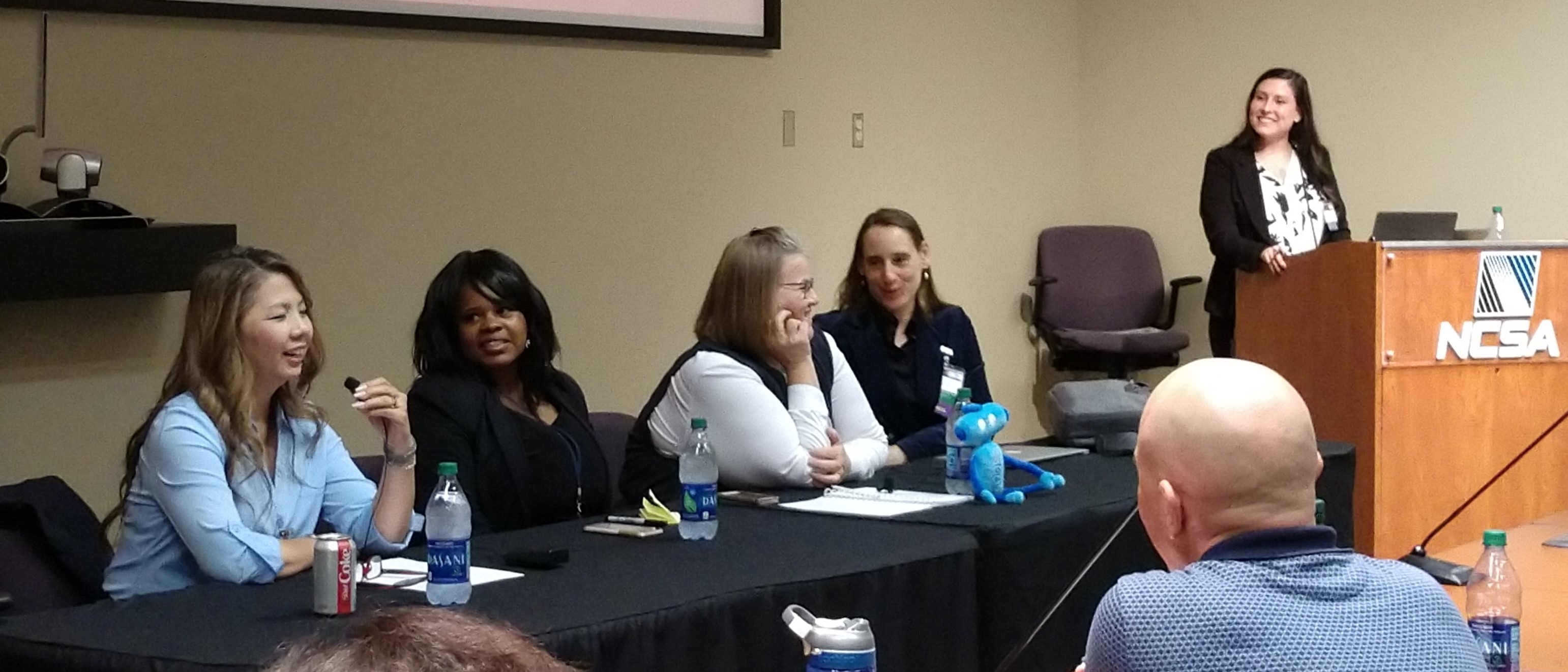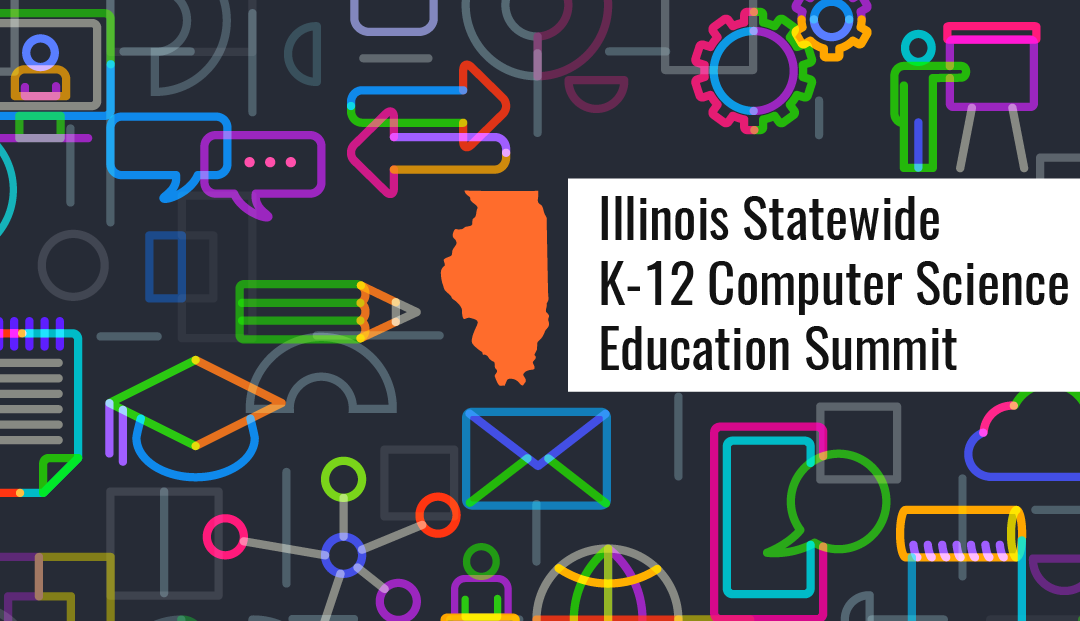Q&A WITH RAYA HEGEMAN-DAVIS
Illinois Secondary Teacher Education and Computer Science Initiative (I-STECS)
On September 20, the inaugural Illinois Statewide K-12 Computer Science Education Summit was hosted at the National Center for Supercomputing Applications (NCSA), at the University of Illinois, Urbana-Champaign. The Summit, spearheaded by the Illinois Secondary Teacher Education and Computer Science Initiative (I-STECS), brought together teachers, industry leaders, and policymakers, to grow Illinois’ computer science workforce. The summit’s long-term goal is to draft a computer science (CS) education plan for the state that addresses equitable access to CS education and the CS teacher shortage.
Attendees had the opportunity to explore several dimensions of statewide CS education. Our very own Becky Goldberg, Program Manager for the Illinois Science and Technology Institute (ISTI), moderated the panel — Achieving CS for All: Diversity and Inclusion — where the focus was on increasing equal access to computer science education and the importance of students and teachers of color in the STEM classrooms.
In this Catalyst Conversations, we sit down with Raya Hegeman-Davis of I-STECS, to talk about the Summit and the goals of I-STECS.
For those who may not be familiar, tell us about the College of Education’s Illinois Secondary Teacher Education and Computer Science Initiative (I-STECS). How did the initiative come together, and what is its mission?
The Illinois Secondary Teacher Education and Computer Science Initiative (I-STECS) is a collaborative effort at the University of Illinois involving faculty and administrators from the College of Education, the College of Engineering (Department of Computer Science) and the Council on Teacher Education to create the first undergraduate program in Illinois to certify high school computer science teachers. I-STECS will also create the second program to add a computer science endorsement to an existing teaching license.
You hosted the inaugural Illinois Statewide K-12 Computer Science Summit on Sept. 20th in Champaign. Tell us about your goals for the event and how people can get involved.
One goal of the Summit was to bring together a diverse set of stakeholders in K-12 Computer Science Education to discuss the current situation in Illinois and what needs to be done to create more equitable access to CS education across the state. We had 210 participants, with another 25 virtual attendees, who came from all areas of the state and represented teachers, administrators, industry professionals, non-profits, policymakers, higher education and more.
The second major goal of the Summit was to begin a conversation around drafting a state plan for CS education. This discussion group aimed to identify the key areas that need to be addressed, such as licensure and endorsement, building and supporting a community for computer science education, developing pathways from K-12 to workforce, and building and supporting computer science education programs. This plan is still under development and we encourage anyone interested to join in and be part of the conversation! More information as well as links to all of the collaborative documents being used in this process and media from the Summit can be found at: https://www.ilcsedsummit.org/engage.html.
Teaching computer science (CS) to younger students is becoming more common nationally. In your view, why is it important for students to learn CS at the K-12 level? What outcomes (short term and long term) would you like to see from students learning CS?
Computer science and computational thinking for the lower grades is as important to future success in the modern workforce as reading, math, and science. All career tracks, whether through four year higher education, trade schools, or school to work programs, require computational thinking and knowledge of computer science. It is no longer just people who wish to enter the field of computer science who need to have this foundational knowledge. As our homes, offices, vehicles, and industrial equipment become “smarter” and increasingly based on data and computer science, our workforce equally needs to understand computer and data science.
Although we are focusing our program at the high school level, this is just the start. Research shows that early exposure in the classroom to computer science and computational thinking is important and often leads to more students, especially girls and other under-represented groups, to choose STEM majors and careers. We think exposure to computational thinking throughout a child’s K-12 educational career is important and necessary for future success.
We would like to see a strong focus on school-to-work pipelines and development. Our goal is to provide K-12 students in Illinois with the right skills and experiences that will allow them to pursue the careers they dream of, and to be successful in those careers. We believe that without exposure to computational thinking and experience with computer science, it will be more challenging for our students to attain and be successful in those careers.

Illinois Statewide K-12 Computer Science Education Summit, Achieving CS For All: Diversity and Inclusion Panel. (Left to right): Lien Diaz, Georgia Tech, Dr. Marlo Barnett, Chicago Public Schools, Ruthe Farmer, CSForAll, Diana Franklin, University of Chicago, Becky Goldberg, ISTI (moderator). September 22, 2019.
Though CS education at the K-12 level is becoming more widespread, finding qualified CS teachers remains a serious challenge. How has the shortage of skilled teachers impacted CS education in Illinois?
Since Illinois has not, thus far, had a program to certify undergraduate students as computer science teachers there has been very limited capacity to produce computer science teachers in Illinois. To compensate for this, there have been many organizations providing short-term professional development opportunities to accompany certain curricula. This has been a great way to boot-strap some CS education in Illinois, however it does not replace the need for teachers whose core content knowledge is in computer science.
The shortage of CS teachers has also meant that the availability of computer science courses, especially outside of the Chicago area, has been very limited. This creates an equity issue in Illinois in terms of which students have access to computer science courses and the opportunities that come along with that experience. The inverse of this is that there are not many computer science courses being taught in Illinois which presents a challenge in terms of creating a new teacher training program. If we begin training new computer science teachers, will they have jobs? This is a complex issue to address and requires a high level of collaboration across multiple groups of education stake-holders.
What are some steps that the state has taken to address this void in computer science education? Is there more than can be done?
In 2016, Governor Rauner convened a Task Force on Computer Science Education which put together a report published in 2017. The report discussed the current situation in Illinois with regards to K-12 computer science education and made a series of recommendations. Following that report, we have seen some legislation drafted on computer science education and the CS education summit come to fruition. Some of the recommendations include revising the licensure process for current and future K-12 CS Educators to distinguish CS from “career and technical education” or other CS alternatives. We have also seen a push to establish an operational definition of K-12 computer science education, and requiring each school in the K-12 system to provide additional data to the Illinois Report Card (the state’s official source for information about public schools in the state) regarding courses offered that are aligned to the definition of computer science.
There has been a lot of interest in computer science education shown at the State level. The Deputy Governor Jesse Ruiz helped to open our Summit and expressed support for the Summit’s goals, State Chief Information Officer Ron Guerrier, as well as a representative from the Illinois State Board of Education were speakers on our panels and a representative from the Illinois State Department of Commerce and Economic Opportunity attended the Summit. This shows a strong support for K-12 Computer Science Education from state-level stake-holders.
What are the Illinois Secondary Teacher Education and Computer Science Initiative endorsement and certification programs, and how do you expect this will change CS education in Illinois in the classroom and at the state level?
We are currently developing a licensure pathway for undergraduate students in computer science education as well as a secondary endorsement for those who already have a primary teacher license. Our secondary endorsement program will have courses that have been tailored specifically to teachers, so they will be taught over the summer and in the evenings and will have content tailored to classroom teachers.
The undergraduate licensure program is still under development, but will provide both content courses in computer science and pedagogy courses in how to teach computer science. We aim to enroll a diverse population of new computer science teachers to return to their home communities and engage and excite their students about computational thinking and computer science.
What we’re reading
- Silicon Valley is Over! Top 10 Cities Where Techies Can Actually Afford to Live [Realtor.com]
- First Women’s Bank would be Chicago’s First Bank startup in 12 years [Crain’s Chicago Business]
- U.S. Continues to Lag Its Competitors on Tax Credits for Research and Development [ITIF]
- Motorola Solutions Opens Innovation Center at the University of Illinois [Chicago Inno]

